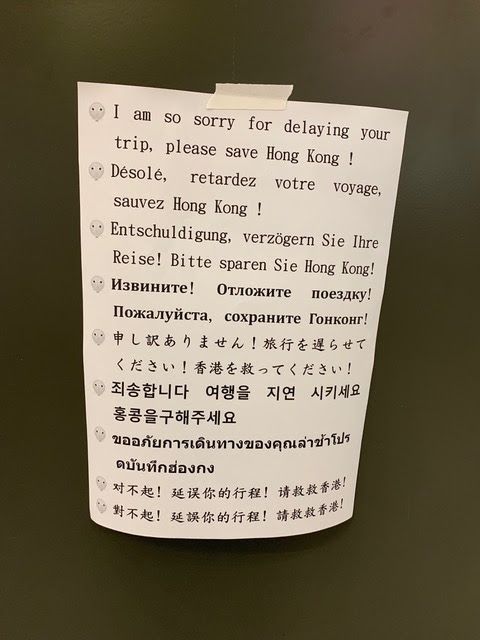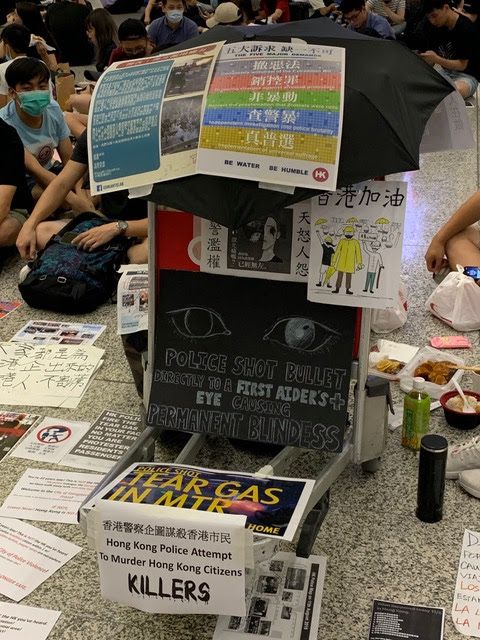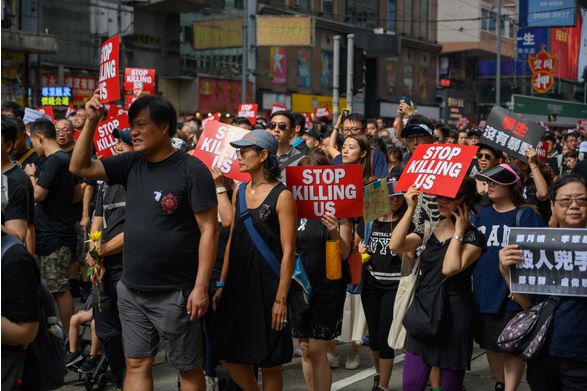And as Hong Kong's 2019 summer of protest heads into its tenth week, there's plenty of publicity for these demonstrations. But there's precious little in the way of clarion support from the leaders of the free world. It's not only President Trump who has been tepid in his comments, tweeting yesterday the alarming confirmation that U.S. intelligence shows China "moving troops to the Border with Hong Kong," but adding — as if there were no colossal difference between China's troops and Hong Kong's protesters — "Everyone should be calm and safe!" In a similar vein, there have been statements from Britain, the European Union, and even the UN Human Rights Council, exhorting everyone to follow the rules and play nice.
That's all very diplomatic, and might be fine if Hong Kong's people were defying the ambitions of, say, Norway or Vanuatu. But they are going up against Beijing, and this is no game. With Chinese troops massing just over the hills, Hong Kongers in their courageous defense of their basic rights could be marching toward a life-or-death showdown, a 21st-century version of Tiananmen, despite China's treaty promise that for 50 years after the 1997 British handover, Hong Kong would enjoy a "high degree of autonomy" under the arrangement dubbed "One Country, Two Systems."
So, who will answer the protesters' calls to stand with Hong Kong?
Backup is sorely needed. Hong Kong has no army of its own with which to defend itself. Officially, it is defended by China's People's Liberation Army, the same military force that brought the world the 1989 Tiananmen slaughter. The PLA has kept a force of thousands of troops garrisoned in Hong Kong since the 1997 handover, which makes it even more ominous that China is now massing additional troops at the border. Hong Kong's police force, with its batons, rubber bullets and turbocharged tear gas, has been deployed during these protests as an enforcement squad for the preferences of China's Communist Party, not Hong Kong's people.
Hong Kong's chief executive, Carrie Lam, was chosen by Beijing, evidently serves Beijing's interests before those of Hong Kong, and would have us believe that her unyielding edicts amount to "rule of law," while in her view the demands for democracy are pushing Hong Kong "into an abyss." Lam ignited these protests in June with her Orwellian bid to enhance Hong Kong's famously functional rule of law with an extradition bill that would leave anyone in Hong Kong naked to the mercies of China's erstwhile legal system (the system that apparently condones Beijing's attempts to brainwash Uighur Muslims en masse in prison camps, and for years imprisoned China's Nobel Peace laureate, the late democratic dissident Liu Xiaobo.)
As Hong Kong's protesters seek ever more fervently, creatively and desperately for any way to fend off Beijing's tightening grip on their lives, it becomes tempting for spectators to start rating them as if they were players in a sports match (or maybe the Hunger Games). There are points for restraint, cheers for wit, boos for violence, fouls for destruction of property, and so forth. No doubt all of this matters, but it is secondary to the basic issue: In Hong Kong, we are seeing a society grounded in freedom being engulfed in plain daylight by the world's most powerful tyranny. If that process isn't stopped now, then where and at what cost will it ultimately be stopped?
Meanwhile, China itself has not been shy about weighing in. Following official statements that Hong Kong's government could, if necessary invite mainland China's forces to "maintain public order," China's spokesman on Hong Kong affairs, Yang Guang, has been transmitting via his recent Beijing press conferences such come-hither messages to Hong Kong's freedom-loving protesters as: "Those who play with fire will perish by it." On Monday, he accused the protesters of starting to show "signs of terrorism."
So, where is the free world's Reaganesque response? Where are the powerful, clear, direct statements so desperately needed from the leaders of America, Britain, Europe, or anywhere else that people live in freedom? Where is the grit and wisdom to say yes — yes we do — we stand squarely with our fellow lovers of freedom, and we will do everything in our power to deter China from snuffing out the flames of freedom. We stand with Hong Kong.





